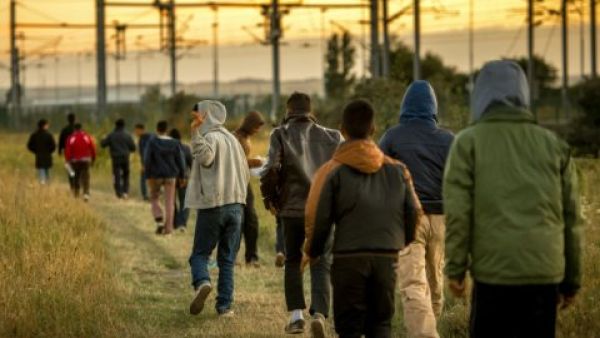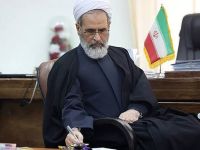Officials from France and Britain signed an agreement Thursday to strengthen security cooperation at a popular border crossing, announcing measures including improved detection technology to stem the flow of migrants and asylum seekers attempting to reach British soil.
French Interior Minister Bernard Cazeneuve and his British counterpart, Theresa May, signed the agreement in the port town of Calais, where hundreds of people have attempted to cross into Britain from Europe during a year of mounting migration pressure.
"We need to understand, here in Calais, that the problem surpasses Calais, it surpasses even the very close cooperation between our bilateral relations," Cazenueve said during a visit alongside May in the morning. He added that some 340,000 migrants have crossed European Union borders since the start of the year.
Additional fencing, surveillance cameras, infrared technology and floodlights are among the measures included to stymie the flow of migrants who hope to reach Britain by hiding on lorries and smuggling themselves through the Eurotunnel. A joint operations centre will also be built for British officers to work alongside French border control.
"Today we commit to even greater cooperation," said May after the agreement was signed. "The situation in Calais is the result of a global migration crisis ... We must relentlessly pursue the callous gangs that profit from smuggling innocent people."
The French Interior Ministry said that some 15 million euros (17 million dollars) announced in 2014 would be put to the project, as well as 5 million euros in British funding per year to be put toward ameliorating migrant conditions and assisting with asylum applications over the next two years. British contributions have totalled 35 million euros, the ministry statement said.
Both Cazeneuve and May stressed the emphasis on busting human trafficking circles and May said that special commanders would be appointed to work against the "gangs." Cazeneuve added that the agreement set out humanitarian measures and called for further support from Europe to extend emergency housing and support for migrants.
Hundreds of French police have already been deployed to Calais amid increasingly desperate attempts to cross via the undersea tunnel. Cazeneueve decried what he said were "too many death, too many injuries," that have tallied in recent months.
Current French-British cooperation at the north-eastern border town was established in a 2003 agreement that places much of the responsibility for British border protection on French soil.
As a site that has become a flashpoint in Europe's migration debate, Calais has prompted harsh criticism from non-profits about the treatment of migrants at the hands of security forces. French aid organizations have also said that demand for services exceeds available resources.
EU Migration Commissioner Dimitris Avramopoulos and commission Vice President Frans Timmermans are scheduled to visit Calais on August 31, the EU's executive said. Avramopoulos welcomed the agreement, saying on Twitter it was a "step forward" for the European migration approach.
While officials at the UN refugee agency (UNHCR) had warned that additional security measures at Calais could force prospective migrants to take even greater risks, High Commissioner for Refugees Antonio Guterres said he "welcome[s] the fact that both governments have agreed to a common approach for a complex situation."
In Britain, opposition Labour Party lawmaker Keith Vaz had earlier criticized the focus on security.
"Closing off one route will only mean the problem moves to another port," Vaz warned. "There is already evidence of more illegal activity around Dunkirk, Zeebrugge and the Hook of Holland," he added, referring to three ports north of Calais in France, Belgium and the Netherlands.
"We need agreements with countries across the north coast to stop this situation developing before we see Calais-like crises spring up at ports across the continent," he said, adding that the issue "remains an EU problem."
Some 3,000 migrants are estimated to be camped in Calais. The crisis at the French port city is only one sign of increasing migration pressure across Europe, which has strained domestic politics and prompted flurried cross-border meetings.
Cazenueve is slated to travel to Germany later Thursday to meet with Interior Minister Thomas de Maiziere, who said in an interview that Germany cannot cope with the pace of refugee arrivals.
"This year we have to cope, and we will. But long-term, 800,000 per year are too much for a country the size of Germany," said de Maiziere during a breakfast show produced by broadcaster ZDF.
Separately, Hungarian President Janos Ader said thousands of migrants are "besieging" his country's borders. Macedonian police also blocked the country's border between with Greece, stranding thousands of migrants trying to travel onwards. Greece has become a primary landing point for African and Middle Eastern migrants attempting to reach Europe.
By Jessica Camille Aguirre








